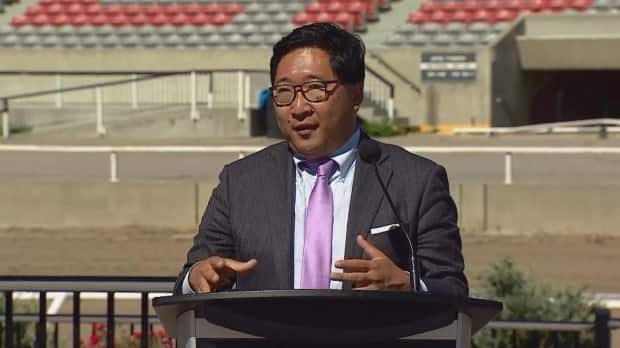Calgary Stampede outlines plans for safe return amid lingering COVID-19 pandemic

Stampede officials say the experience at this year's event will be safe and enjoyable — and quite a bit less crowded than usual.
Among the differences visitors to the Stampede can expect are a pre-purchase system for park admission to control crowd numbers and a roughly 25 per cent reduction in the number of attractions and rides on the midway to give people more space.
"It will be reduced capacity everywhere and in all venues," said the Stampede's interim CEO, Dana Peers, at a media briefing on Monday.
He also said it's anticipated that the seating capacity at the Grandstand will be limited to half.
Attendees could be required to show proof of vaccination or undergo rapid testing to enter venues, including the Nashville North live music tent.

Dr. Jia Hu, the Stampede's public health physician adviser, said masks will be mandatory for all front-line workers, and park visitors will be encouraged to wear them as well.
Staff and volunteers will also be required to have rapid COVID-19 testing.
"You know, we understand that certain things are riskier than others. And that's why we're implementing things like masking, like rapid testing, considering proof of vaccination. And all of it is to say that I think that this can be done safely and responsibly," Hu said.
There will be teams of workers tasked exclusively with cleaning and sanitizing things on the grounds.
Hu says the Stampede has also come up with contact tracing protocols, which will be especially helped by the electronic ticketing system for the Grandstand events. It would be used if a COVID-19 case turned up on the grounds.
"In that situation, we'll know who people are, we'll be able to rapidly notify them," he said.
"In the event that something happens, we'll be very quickly able to contain it."
The Stampede said in a release that it is collaborating directly with Alberta Health "in order to create the best possible experience for 2021."
A doctors group in Edmonton has urged the premier to cancel major summer events, including the Stampede, or postpone them until fall.
"There's been a lot of debate lately about how Alberta should open up again and when," Steve McDonough, president and board chairman of the Calgary Stampede, said Monday.
"There have been criticisms of the Stampede for being one of the first organizations to open the gates. Other parts of the world have shown us that we can begin the opening of our doors as long as it's done responsibly.
"We recognize that we are leading the way in Canada with our event and we do so following best practices, advice and safety protocols."
Last week, Ottawa confirmed that rodeo performers and some staff coming from out of the country have been granted a federal COVID-19 travel exemption to participate in this year's Stampede.
The world-renowned rodeo and fair is set to go ahead July 9 and run for 10 days.

